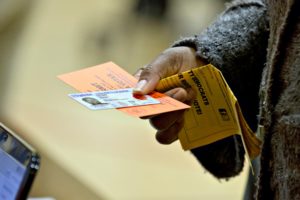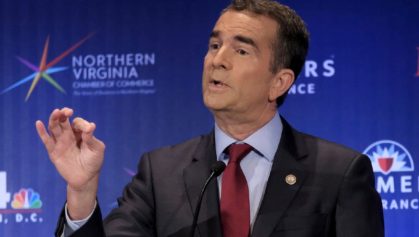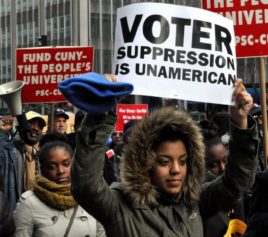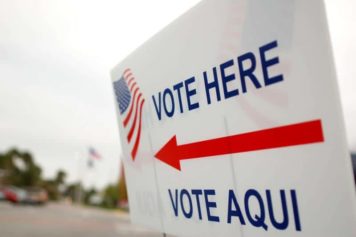Republicans are continuing their assault on the right to vote. The latest attack comes in the form of action taken by Brian Newby, executive director of the U.S. Elections Assistance Commission (EAC), who unilaterally approved three states requiring proof-of-citizenship to vote.
However civic groups are fighting back. The Georgia NAACP and the League of Women Voters are among the plaintiffs who filed a lawsuit to block Newby’s action, according to Talking Points Memo (TPM.) The lawsuit calls for a primary injunction to halt the proof-of-citizenship requirement, which has been added to the ballot in Kansas, Georgia and Alabama.
Elisabeth MacNamara, president of the League of Women Voters of the United States, said laws shouldn’t make it difficult to participate in the electoral process.
“Voters should not have to face an obstacle course to participate and vote,” said MacNamara in a news release.
The lawsuit alleges Newby’s decision could jeopardize the Kansas caucus and the Alabama primary, both set to take place next month.
“The timing of the Executive Director’s decision jeopardizes the integrity of several upcoming federal elections,” said the lawsuit.
However, Newby is simply taking voter suppression laws to a national platform. Before moving to Washington, Newby was Johnson County election commissioner, where he worked alongside Kansas Secretary Of State Kris Kobach, who has become notorious for his campaign to push for voter suppression laws in the state.
According to ThinkProgress, Kobach is a staunch supporter of proof-of-citizenship requirements and has attempted to purge more than 30,000 voters from the state rolls, because they couldn’t prove they were citizens. The lawsuit also implies that Newby had a close relationship with Kobach.
“Tellingly, while Mr. Newby failed to provide formal public notice and an opportunity to comment before changing the EAC’s policy, on information and belief, he entertained several ex parte communications from the Kansas Secretary of State, along with similar communications with officials from Alabama and Georgia, before he approved the States’ requests,” said the lawsuit.
Newby’s actions are part of a string of new measures which are designed to suppress minority voter turnout. In tight races, having fewer minority voters show up at the polls can swing an election in the favor of Republicans.
According to Talking Points Memo, a study by the University of California, San Diego shows that voter suppression laws do indeed drive down Blacks and Latinos votes, two groups that tend to support Democrats.
“Our study is the first really comprehensive study that’s been done over many election cycles — I think we have something like 51 elections in there — that very clearly shows how minority voters are affected, and how they’re adversely and disproportionately affected compared to their white counterparts,” said political science professor Nazita Lajevardi, one of the researchers, in an interview with TPM.
The study revealed that states which enacted strict photo ID laws saw a 10.3 point drop in Latino voter turnout in general elections and a 1.6 drop in Black voter turnout in primaries. The UC San Diego study also showed photo ID laws double the gap between Democrat and Republican voters from 2.3 points to 5.6 points in general elections. Voter ID laws not only affect minority voters, they also affect low-income voters, seniors and naturalized citizens.
“Working through the numbers, naturalized citizens were 12.7 percent less likely to vote in general elections and 3.6 percent less likely to vote in primaries in strict photo states,” said the study.
Republicans claim voter ID laws protect against voter fraud, but election fraud is rare. According to The Atlanta Blackstar, Lorraine Minnite, an associate professor of public policy at Rutgers University, who testified at a trial over voting rights in North Carolina, found only two cases of voter impersonation among 35 million ballots cast between 2000 to 2014.
As the UC San Diego research study proves, its becoming increasingly obvious these laws are designed to stop certain groups of people from voting.
“When we look at this pattern and then we look at the gaps between these groups and whites, we can say that these laws are really limiting the ability of this new and emerging group of people to really participate in a meaningful way in American democracy,” Lajevardi said.



